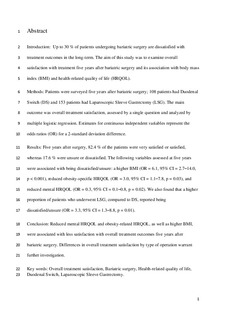| dc.contributor.author | Hegland, Pål Andre | |
| dc.contributor.author | Aasprang, Anny | |
| dc.contributor.author | Kolotkin, Ronette L. | |
| dc.contributor.author | Tell, Grethe S. | |
| dc.contributor.author | Andersen, John Roger | |
| dc.date.accessioned | 2020-02-10T08:20:26Z | |
| dc.date.available | 2020-02-10T08:20:26Z | |
| dc.date.created | 2019-08-22T09:27:27Z | |
| dc.date.issued | 2019 | |
| dc.identifier.citation | Hegland, P. A., Aasprang, A., Kolotkin, R. L., Tell, G. S. & Andersen, J. R. (2020). Overall treatment satisfaction 5 years after bariatric surgery. Obesity Surgery, 30(1), 206-213. | nb_NO |
| dc.identifier.issn | 0960-8923 | |
| dc.identifier.uri | http://hdl.handle.net/11250/2640573 | |
| dc.description | This is a post-peer-review, pre-copyedit version of an article published in Obesity Surgery. The final authenticated version is available online at: https://doi.org/10.1007/s11695-019-04141-7 | nb_NO |
| dc.description.abstract | Introduction
Up to 30 % of patients undergoing bariatric surgery are dissatisfied with treatment outcomes in the long term. The aim of this study was to examine overall satisfaction with treatment 5 years after bariatric surgery and its association with body mass index (BMI) and health-related quality of life (HRQOL).
Methods
Patients were surveyed 5 years after bariatric surgery; 108 patients had duodenal switch (DS) and 153 patients had laparoscopic sleeve gastrectomy (LSG). The main outcome was overall treatment satisfaction, assessed by a single question, and analyzed by multiple logistic regression. Estimates for continuous independent variables represent the odds ratios (OR) for a 2-standard deviation difference.
Results
Five years after surgery, 82.4 % of the patients were very satisfied or satisfied, whereas 17.6 % were unsure or dissatisfied. The following variables assessed at 5 years were associated with being dissatisfied/unsure: a higher BMI (OR = 6.1, 95 % CI = 2.7–14.0, p < 0.001), reduced obesity-specific HRQOL (OR = 3.0, 95 % CI = 1.1–7.8, p = 0.03), and reduced mental HRQOL (OR = 0.3, 95 % CI = 0.1–0.8, p = 0.02). We also found that a higher proportion of patients who underwent LSG, compared to DS, reported being dissatisfied/unsure (OR = 3.3, 95 % CI = 1.3–8.8, p = 0.01).
Conclusion
Reduced mental HRQOL and obesity-related HRQOL, as well as higher BMI, were associated with less satisfaction with overall treatment outcomes 5 years after bariatric surgery. Differences in overall treatment satisfaction by type of operation warrant further investigation. | nb_NO |
| dc.language.iso | eng | nb_NO |
| dc.publisher | Springer | nb_NO |
| dc.subject | overall treatment satisfaction | nb_NO |
| dc.subject | bariatric surgery | nb_NO |
| dc.subject | health-related quality of life | nb_NO |
| dc.subject | duodenal switch | nb_NO |
| dc.subject | laparoscopic sleeve gastrectomy | nb_NO |
| dc.title | Overall Treatment Satisfaction 5 Years After Bariatric Surgery | nb_NO |
| dc.type | Journal article | nb_NO |
| dc.type | Peer reviewed | nb_NO |
| dc.description.version | acceptedVersion | nb_NO |
| dc.subject.nsi | VDP::Medisinske Fag: 700::Klinisk medisinske fag: 750::Gasteroenterologisk kirurgi: 781 | nb_NO |
| dc.source.pagenumber | 206-213 | nb_NO |
| dc.source.volume | 30 | nb_NO |
| dc.source.journal | Obesity Surgery | nb_NO |
| dc.source.issue | 1 | nb_NO |
| dc.identifier.doi | 10.1007/s11695-019-04141-7 | |
| dc.identifier.cristin | 1717891 | |
| cristin.unitcode | 203,11,1,0 | |
| cristin.unitname | Institutt for helse- og omsorgsvitskap | |
| cristin.ispublished | true | |
| cristin.fulltext | postprint | |
| cristin.qualitycode | 1 | |
